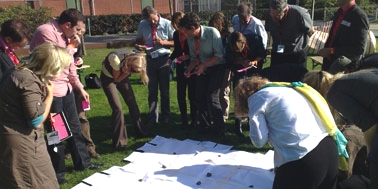16 Feb 2012
Commons-based Peer-production erreicht die materielle Welt
In December last year (2011) I was invited to speak about commons-based peer production at the Institute for Ecological Economy Research in Berlin; the text of my presentation «Commons-based Peer-production erreicht die materielle Welt» is online here: [scribd id=78516132 key=key-1hjytzeuh498ozsfmpof mode=list]
11 Dec 2011
Fab Lab Business Modelling
In this eBook, I cover briefly existing Fab Lab business models (including prominently the grassroots model as described by Harmen Zijp for Amersfoort). I introduce tools for the development of business models: The Business Model Canvas (Alex Osterwalder et al.) A “buy” wordle Kevin Kelly’s “Better than Free” Persona Customer Journey [scribd id=69798096 key=key-2ecwff5v9olzh0alale0 mode=list]
19 Oct 2011
Libraries of the Peer Production Era

Mapping the landscape of commons-based peer production, I analyse the arena of open source hardware and look into various initiatives being spawned by fabrication labs, trying to identify their business potential and asking how these initiatives contribute to giving people more control over their productivity in self-directed, community-oriented ways. Now also available online at opendesignnow.org
10 Feb 2011
100 People, 24 Hours, 17 Projects and Tons of CO2 Reduction
In 2008 I had the chance to design and run a 24-hour creative marathon for ETH Zurich (for details and credits see here). The over 100 participants generated 17 project proposals how to reduce CO2 emissions and energy consumption at this university. Not only was this great fun to do; Patricia Wolf and Ralf Hansmann,
09 Oct 2010
Fab Labs and their Business Models
The paper “Commons-Based Peer-Production of Physical Goods—Is There Room for a Hybrid Innovation Ecology?” is the last publication this year on the subject of Fab Labs and their business models. It includes in total three studies: the final results from the Fab Lab survey that I did together with the University of Applied Sciences and
08 Sep 2010
Bending the Rules: The Fab Lab Innovation Ecology
To be successful, e.g. in business, it’s often needed to go beyond what’s typically believed to be the normal way of doing things, to be creative when applying rules. This is not different for making Fab Labs a success. In a recent paper, I explore two sets of rules: intellectual property protection and common fab
06 Aug 2010
Sponsoring FAB6 *
There is a new digital revolution going on, the revolution of personal digital fabrication. Happening in Fab Labs all over the world it has exciting consequences for art, business, industry, culture and education. These implications might, some speculate, equal the implications of the industrial revolution of the late 18th and early 19th century. Easy access
24 Jul 2010
Open Content Business Models

Traditional business models of the creative industries are built on the protection of content. With the advent of an Internet culture where content is ‘sold’ at a price of zero and sharing is a key paradigm, that model seems not to be fully adequate any longer, even more, there might be a time when content
24 Jul 2010
Fab Lab

Fab Labs are one of the smaller crazes these days, it seems. Every month, one or two new initiatives spring up in Europe alone. This is maker culture claiming its presence on this planet. So where does this development lead us? And how to make a Fab Lab sustainable … socially, ecological, and business wise?
24 Jul 2010
Co-Creation

Square One investigates and develops models and formats of co-creation, particularly the development and delivery and evaluation of “unconference” and co-creation formats in academia and business, together with colleagues from VTT (Helsinki, Finland) and ETH Zurich (Switzerland). Details can be found on
- 1
- 2